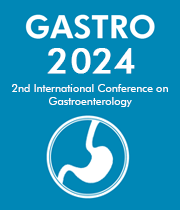Title : An unexpected abscess - A unique pesentation of colorectal carcinoma
Abstract:
Introduction:
Colorectal carcinoma (CRC) is the third most common cancer and the second leading cause of cancer-related deaths in the US. Classic manifestations of CRC include rectal hemorrhage, unintentional weight loss, abdominal discomfort, and changes in bowel habits, which necessitate comprehensive endoscopic evaluation. CRC can lead to common complications such as invasion into adjacent structures, luminal obstruction, or catastrophic perforation. However, the formation of an abscess concomitant with colorectal carcinoma is rare, with an estimated incidence rate of 0.3% to 4%. In this report, we present a rare case of extensive tumor invasion with peri-colonic abscess formation.
Case Presentation:
A 55-year-old male with a history of type 2 diabetes mellitus presented with a three-week history of intermittent hematochezia, lower left quadrant abdominal pain, nausea, vomiting, and weight loss. He had not undergone prior colonoscopies, and there was no family history of colorectal cancer. Imaging performed upon admission revealed circumferential thickening of the sigmoid colon wall with associated inflammatory changes. Additionally, there was a multiloculated, peripherally enhancing fluid collection surrounding the sigmoid colon, with the largest dimension measuring 5.4 x 4.5 cm.
Gastroenterology was consulted for a colonoscopy, which revealed a 5 cm fungating, infiltrative mass causing partial obstruction in the sigmoid colon. Evidence of pus extravasation was observed around the mass. Biopsies were taken, and the findings indicated moderately differentiated invasive adenocarcinoma with tumor extension through the muscularis propria into the peri-colorectal tissue, resulting in the formation of a mesenteric/peri-colonic abscess with necrosis and abundant neutrophils.
The patient subsequently underwent a low anterior resection, with en bloc resection of the tumor, small bowel resection followed by re-anastomosis, and the creation of an ileostomy by the colorectal surgery team. Before discharge, a follow-up appointment was scheduled with medical oncology to initiate adjuvant therapy.
Discussion:
Colorectal carcinoma is one of the most frequently diagnosed malignancies worldwide. While well-documented complications of colorectal carcinoma include adjacent tissue invasion, luminal obstruction, or catastrophic perforation, the concurrent occurrence of a peri-colonic abscess is exceedingly rare. This case highlights the importance of recognizing atypical complications in the clinical evaluation of colorectal cancer patients. Early detection and timely intervention, as demonstrated in this case with the low anterior resection and initiation of adjuvant therapy, are crucial in optimizing outcomes for patients with complex presentations of colorectal carcinoma. Continued research and heightened clinical awareness are essential to advance our understanding and treatment strategies for these uncommon manifestations.
Audiences Take Away:
-
Rare Complication Awareness: This case underscores the importance of being aware of uncommon complications in patients with colorectal carcinoma, particularly when they present with atypical symptoms like abscess formation. While CRC often presents with well-documented signs and symptoms, healthcare providers should be prepared to consider and investigate rare complications.
-
Timely Diagnosis and Intervention: Early detection and prompt intervention are critical in optimizing outcomes for patients with complex presentations of colorectal carcinoma. In this case, the timely identification of the abscess, followed by a low anterior resection and the initiation of adjuvant therapy, exemplify the significance of timely management.
-
Multidisciplinary Approach: The management of complex colorectal carcinoma cases often requires a multidisciplinary approach involving gastroenterologists, radiologists, surgeons, and oncologists. This collaboration ensures a comprehensive evaluation and tailored treatment plan for each patient, as demonstrated in this case.
-
Research and Clinical Awareness: Uncommon manifestations of colorectal carcinoma, such as abscess formation, warrant continued research and clinical awareness. Healthcare professionals should remain vigilant and informed about rare complications to provide the best possible care for CRC patients and contribute to expanding our understanding of these infrequent occurrences.



